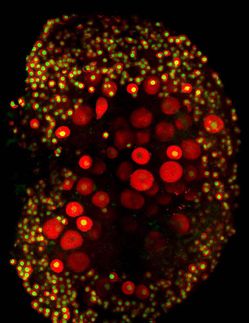Therapeutic Vaccines for Cancer Treatment
VPM organizes clinical development - Initial focus on prostate cancer
Advertisement
Braunschweig/Munich/New York. Vakzine Projekt Management GmbH (VPM), Braunschweig, Germany, has obtained from Memorial Sloan-Kettering Cancer Center a worldwide exclusive license for several patents covering a range of recombinant cell lines. These cell lines have a high potential to stimulate the immune system of cancer patients during their treatments. Together with clinical partners VPM will develop these cell lines as therapeutic vaccines for cancer treatment. Initial focus will be on prostate cancer, the most often seen tumor in men over 50 years and the third leading cause of cancer related death. Other cancer types potentially to be targeted are melanoma and renal carcinoma.
The technology has been developed at Memorial Sloan-Kettering Cancer Center's Sloan-Kettering Institute by Prof. Dr. Bernd Gaensbacher, now with the Institute of Experimental Oncology and Therapy Research at Technical University Munich. Prof. Gaensbacher will now be development partner of VPM for clinical trials in prostate cancer patients. VPM was founded under a national vaccine initiative launched 2002 by the German government. VPM is a project management company dedicated to transferring results of leading academic vaccine research into therapeutic or protective drugs for patient's use.
"Standard therapy of prostate cancer is surgical resection of the tumor. In case of recurrence or formation of metastases, further surgical treatments and a hormone therapy are first choice. Unfortunately, approximately in 30 % of all patients neither this treatment nor chemotherapy or radiation leads to a long-term success", says Prof. Gaensbacher. "That's why we have started developing a therapeutic vaccine. We have genetically engineered a cell line that comes from a prostate cancer patient and have introduced two genes in these cells - one expressing interferon- gamma, the other interleucin-2. Interferon-gamma secretion leads to a better presentation of tumor specific antigens to the immune system and thus to a more effective immune response against tumor cells. Interleucin-2 secretion increases the activity of certain T-cells which are able to kill cancer cells". In contrast to unmodified cells, these so called LNCaP cells should be able to mobilize the natural immune defense of the body and combat cancer.
VPM managing director Albrecht Laeufer notes "health experts estimate a number of roughly 400,000 new prostate cancer patients annually. Later on, we will adapt the technology to fight other cancer diseases. Considering the poor prognosis for many patients, there is a high medical need for developing a potent and long-lasting cancer therapy." Therefore, successful therapeutic vaccines such as our LNCaP cells have considerable economic potential." VPM's goal is development up to proof of concept in a clinical phase II, followed by licensing out to industrial partners.























































